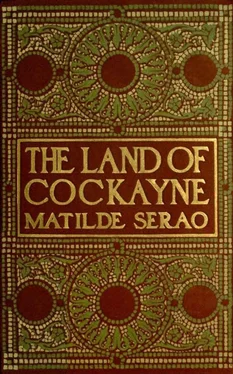Matilde Serao - The Land of Cockayne
Здесь есть возможность читать онлайн «Matilde Serao - The Land of Cockayne» — ознакомительный отрывок электронной книги совершенно бесплатно, а после прочтения отрывка купить полную версию. В некоторых случаях можно слушать аудио, скачать через торрент в формате fb2 и присутствует краткое содержание. Жанр: unrecognised, на английском языке. Описание произведения, (предисловие) а так же отзывы посетителей доступны на портале библиотеки ЛибКат.
- Название:The Land of Cockayne
- Автор:
- Жанр:
- Год:неизвестен
- ISBN:нет данных
- Рейтинг книги:3 / 5. Голосов: 1
-
Избранное:Добавить в избранное
- Отзывы:
-
Ваша оценка:
- 60
- 1
- 2
- 3
- 4
- 5
The Land of Cockayne: краткое содержание, описание и аннотация
Предлагаем к чтению аннотацию, описание, краткое содержание или предисловие (зависит от того, что написал сам автор книги «The Land of Cockayne»). Если вы не нашли необходимую информацию о книге — напишите в комментариях, мы постараемся отыскать её.
The Land of Cockayne — читать онлайн ознакомительный отрывок
Ниже представлен текст книги, разбитый по страницам. Система сохранения места последней прочитанной страницы, позволяет с удобством читать онлайн бесплатно книгу «The Land of Cockayne», без необходимости каждый раз заново искать на чём Вы остановились. Поставьте закладку, и сможете в любой момент перейти на страницу, на которой закончили чтение.
Интервал:
Закладка:
'In the carriage,' he said shortly. Then, going up to Margherita, he went on in a low, forcible voice: 'I am coming with my coachman just now. She can't stay here; I can't do anything for her here. We will carry her out to the carriage and go home.'
'In this state?' she asked undecidedly.
'Do you want her to die here?' he interrupted brusquely.
'Please forgive me, sir.'
He had already gone out, without his hat and overcoat, across the passage and icy court. After a minute he came back with the coachman, who had evidently got his orders.
The doctor gently raised the fainting girl's body from under the arms, resting her head on his breast, while the coachman raised her feet. She was almost rigid and very heavy. The coachman had a frightened look; perhaps he thought he was carrying out a dead woman, all in black, through that bare parlour, deserted corridor, and chilly court; and although the sight of physical suffering was not new to him, being in a successful doctor's service, the idea of carrying a young woman's cold body, a corpse perhaps, gave him such a shudder he turned away his head. Old Margherita, coming behind, looked yellower, more like wrinkled parchment than ever, in the bright court. The procession of the anxious doctor, the frightened man, the rigid figure in black, and the old servant sadly bent by a strange new anguish, moved silently across the silent, tomb-like cloister, like a funeral. Gently, with the care needed not to waken a sleeping baby, the two men placed the poor lifeless creature in the carriage, her head against the cushions and her feet on the opposite seat. She had not given a sign of life whilst she was being carried; the two lines deepened between Dr. Amati's eyebrows, lines showing a strong will and deep thought, but which gave him an absent-minded look. Margherita still gently tried to rearrange the girl's loosened tresses that had fallen down, but she did not manage it, her lean hands trembled so; she, too, had got into the broad landau; she gathered up her mistress's hair caressingly, and the doctor heard her mutter, 'My darling! my darling!'
He had lowered the blue blinds against indiscreet eyes; the carriage went at a foot-pace; and in that bluish, misty shade the slow pace kept up the idea of a funeral still more. However, the carriage stopped at one point; after a little the coachman opened the door, and handed in to the doctor a hermetically sealed phial, which he held to the unconscious girl's nose. A sharp smell of ether at once spread through the carriage, which was still going very slowly. Bianca Maria never moved; after a little there was one sign of feeling: her closed eyelids got red, big tears burst out between the lashes and ran down her cheeks. The doctor did not take his eyes off her for a minute, keeping her hand in his. She went on weeping, still unconscious, without giving another sign of life: as if she still felt sorrow through her unconsciousness, as if through her loss of memory one bitter recollection still remained—only one. She did not recover consciousness.
When they got to the Rossi Palace courtyard, hardly was the door opened when a murmuring noise broke out, gradually growing stronger, impossible to restrain. Beside the carriage door the porter's wife called out and screamed as if the girl was dead. All the windows looking into the courtyard, all the landing-place doors, had opened to see the poor, fainting, pale creature in black, with hair hanging down, taken out of the carriage. The doctor vainly tried to insist on silence, but the cry of surprise and compassion grew louder, rising in the heavy air.
On the first-floor landing-place Gelsomina, Agnesina Fragalà's nurse, came out, holding the pretty, healthy infant in her arms; the happy mother, Luisella Fragalà, came behind her, dressed to go out, with her bonnet on. But she lingered, leaning on the iron railing, smiling vaguely at her baby, and looking pityingly on the strange escort. She had felt rather tired and preoccupied for some time past, for she had been going every day to the Santo Spirito shop, from an instinct, a presentiment, that was stronger than her pride, tying up the parcels of sweets and cakes with her ring-covered, white hands.
'Poor thing! poor thing!' Luisella Fragalà muttered; her compassion had a deeper, acuter feeling in it than the other people's had.
Raising the heavy yellow brocade curtains behind her double windows on the first-floor, Signora Parascandolo's bloodless face appeared—the rich usurer's wife who had lost all her children.
She seldom went out; she stayed shut up in her gorgeous apartment, full of rich furniture now quite useless and dreary, as she never received anyone since her sons died; only she looked out of the window now and then in a silly kind of way that had grown on her. On seeing Bianca Maria carried up in that way, the poor woman, who took an interest in nothing usually, opened the window, and her voice was added to the rising tumult, crying in prayer and supplication, 'Jesus, Jesus, help us!' All Domenico Mayer's misanthropic family came out on the third-floor landing, leaving their three-roomed little flat that looked on to the Rossi Theatre. First came the father's long, peevish face, and, having just left some copying work brought home from the Finance Office, he had sleeves on to save his coat; then Donna Christina, the mother, who had got rid of the tooth-ache but had a stiff neck instead; next Amalia, with her staring eyes, thick nose and lips, and sulky look of a girl who has not yet got a husband; and Fofò, still afflicted by the hunger which his relations said was a mysterious illness. The whole family nearly threw themselves over the railings out of curiosity, and shrieked out in a chorus: 'Poor girl! poor girl!' A woman in a muslin cap and a man in a blue sweeping-apron were at the window—even the doctor's housekeeper; nor did they stop gazing when their master came up, so overpowering was the excitement in all the Rossi Palace.
That carrying up the stair, amid the noisy compassion of all these different people, the frightened, pitying shrieks, that had a false ring about them, seemed endless to Dr. Amati; as for old Margherita, she shook with annoyance and shame, as if that noise and publicity were insulting to her mistress.
When the door was shut behind them, she asked Giovanni in a fright: 'Is milord not in? Milady is ill.'
'No,' he said, making way for the bearers.
Margherita shook her head despairingly. She went with the doctor and his man into Bianca Maria's room; the girl was laid on the bed. The man-servant went away. The doctor again tried to bring her back with ether—no result. He bit his lip; he said twice or thrice, 'It is impossible!' Once again he raised the violet eyelids, looking at her eyes. She was alive, but she did not recover consciousness.
'Where is her father?' he asked, without turning round.
'I don't know,' the old woman muttered.
'There will be some place he goes every day; send for him.'
'I will send, as you order me to,' she said, still hesitating; and she went out.
He sat down by the bedside, and laid down the ether bottle, convinced now it was useless. That bare, cold little room, with a look of childish purity, had calmed somewhat the scientist's dull anger at not being able to cure nor find out the reason of the illness. He had seen, a hundred times, long, queer fainting fits; but they were from nervous illnesses, from abnormal temperaments, out of order from the beginning, and ordinary methods had overcome them. The colourless young girl seemed to be sleeping heavily, and she might remain so for many hours, wrapped up in the dark regions of unconsciousness. He armed himself with patience, turning over in his mind medical books that spoke of such fainting fits. Twice or thrice Margherita had come back into the room, questioning him with an agonized look; he shook his head, 'No.' Then he asked her for brandy. She stood hesitating; there was none in the house. Amati told her to go and ask for it in his flat next door. With a teaspoon, a wretched one that had lost its plating, he opened the girl's lips, and poured the strong liquor through her closed teeth, with no result. Again, he asked Margherita, who was fidgeting about, to heat flannel cloths; seeing her still embarrassed, he told her to go to his house, and ask the housekeeper for some.
Читать дальшеИнтервал:
Закладка:
Похожие книги на «The Land of Cockayne»
Представляем Вашему вниманию похожие книги на «The Land of Cockayne» списком для выбора. Мы отобрали схожую по названию и смыслу литературу в надежде предоставить читателям больше вариантов отыскать новые, интересные, ещё непрочитанные произведения.
Обсуждение, отзывы о книге «The Land of Cockayne» и просто собственные мнения читателей. Оставьте ваши комментарии, напишите, что Вы думаете о произведении, его смысле или главных героях. Укажите что конкретно понравилось, а что нет, и почему Вы так считаете.












